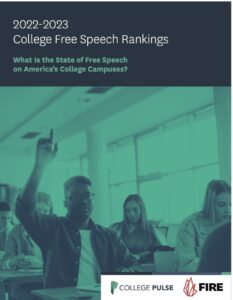FIRE’s Position on Government Attempts to Ban there Teaching of Divisive Concepts
FIRE's Position on government attempts to ban the teaching of divisive concepts in schools:
FIRE has been tracking and engaging with legislation that would regulate how race and sex is discussed on college and university campuses.
In the past few years, this typically came in the form of bans on training or teaching so-called “divisive” concepts. This legislative season appears no different as several states in the past three months have either issued executive orders or introduced legislation on this topic.
These states include Alabama, Arkansas, Mississippi, Missouri, North Dakota, Oregon, South Carolina, Texas, West Virginia, and Wyoming.
While FIRE takes no position on bill provisions that apply to the K-12 context, in which states generally have broader authority to set curricula, it’s worth noting that even with such broad authority, K-12 legislation could face vagueness challenges if it does not clearly set forth what it prohibits.
We also do not oppose provisions that would regulate or prohibit mandatory non-credit-earning training at institutions of higher education. Restrictions on the content and views expressed during non-credit-earning training doesn’t infringe on the First Amendment or principles of academic freedom because the content of those trainings constitute the government’s own speech. The government is allowed to regulate its own speech and that of government agencies under its control. We also acknowledge that the government can prohibit institutions from compelling students or faculty to communicate personal agreement with views they do not hold.
FIRE, however, does oppose legislation that would institute curricular bans on particular concepts or ideologies at institutions of higher education. These curricular bans threaten academic freedom — which protects the rights of faculty to teach and assert positions as they see fit — and disregards decades of judicial precedent confirming the critical importance of academic freedom in higher education.
FIRE will fight any legislation that crosses the bright line that prohibits the government from banning ideas in college classrooms. Indeed, FIRE is currently fighting Florida’s “Stop WOKE Act” in federal court, a law passed last year that restricts instruction on eight concepts related to “race, color, national origin, or sex” in college classrooms. After we filed suit, the court halted enforcement of the law, recognizing that it violates the First Amendment rights of students and faculty."
Note about proposed Missouri legislation:
"Missouri’s HB 75 would prohibit an employee of an institution of higher education from requiring or making “part of a course,” eight concepts related to race or sex stereotyping. Like Florida’s Stop WOKE Act, this provision threatens free speech and academic freedom by regulating what faculty members are allowed to say in their classrooms.

